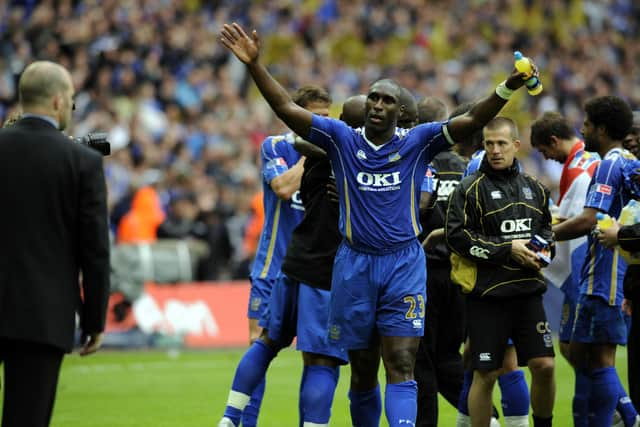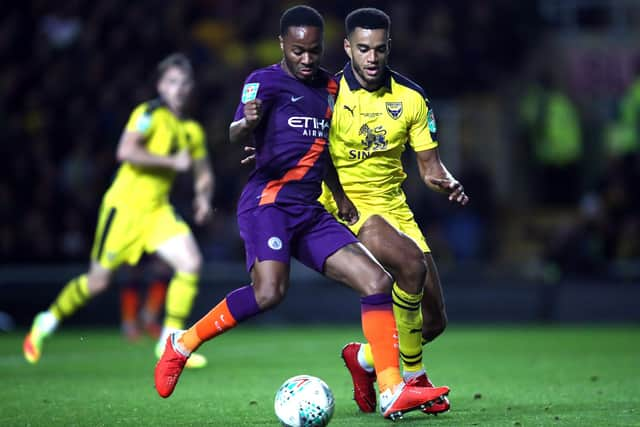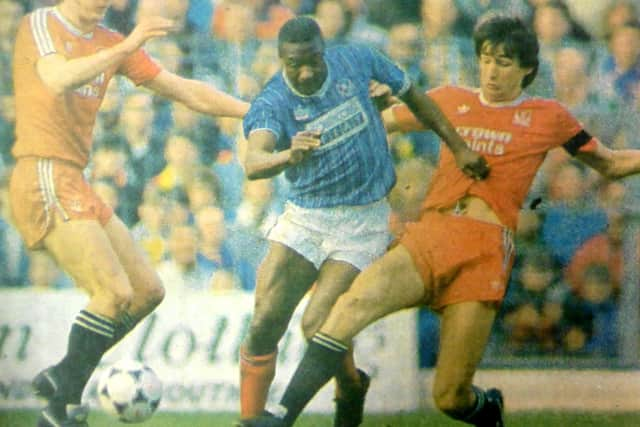Raheem Sterling: ‘It’s not about taking the knee, it’s about giving people the chance they deserve’


The Manchester City and England forward made the comments during an appearance on the BBC's flagship political programme, Newsnight, in the wake of anti-racism protests that have taken hold across the world.
Advance clips had shown the 25-year-old offering his support to those who have taken to the streets in the aftermath of civilian George Floyd's death at the hands of police in the United States, but the full interview with Emily Maitlis on Monday saw him focus on matters closer at hand.
Advertisement
Hide AdAdvertisement
Hide AdReflecting on his own sport, Sterling pointed a finger at the long-running disparity between the number of high-profile BAME players and the dearth of those who go on to win significant managerial, coaching or administrative jobs.


Sterling cited the respective fortunes of Steven Gerrard and Frank Lampard, who have landed top roles at Glasgow Rangers and Chelsea in the early stages of their management careers, as compared to equally experienced black players who have been compelled to start much lower down the ladder.
‘This is a time to speak on these subjects, speak on injustice, especially in my field,’ said Sterling.
‘There's something like 500 players in the Premier League and a third of them are black and we have no representation of us in the hierarchy, no representation of us in the coaching staffs.
Advertisement
Hide AdAdvertisement
Hide Ad‘There's not a lot of faces that we can relate to and have conversations with.


‘With these protests that are going on it's all well and good just talking, but it's time that we need to have conversations, to be able to spark debates.
‘But at same time, it's coming together and finding a solution to be able to spark change because we can talk as much as we want about changing and putting people, black people, in these positions that I do feel they should be in.
‘I'll give a perfect one. There's Steven Gerrard, your Frank Lampards, you have your Sol Campbells and you have your Ashley Coles. All had great careers, all played for England.
Advertisement
Hide AdAdvertisement
Hide Ad‘At the same time, they've all respectfully done their coaching badges to coach at the highest level and the two that haven't been given the right opportunities are the two black former players.


‘I feel like that's what's lacking here, it's not just taking the knee, it is about giving people the chance they deserve.’
Factually, Sterling is spot on. Out of the 115 managers in the top five tiers of English football, only five are from a BAME background - just over four per cent.
Only one, Wolves boss Nuno Espirito Santo, is with a Premier League club. The others are Sabri Lamouchi (Nottingham Forest), Darren Moore (Doncaster), Dino Maamria (Oldham) and Campbell (Southend).
Advertisement
Hide AdAdvertisement
Hide AdWhile his former England colleagues Gerrard and Lampard bagged jobs with very high-profile clubs, ex-Pompey skipper Campbell - a man who won 73 England caps - began his managerial career in League 2 with unglamorous Macclesfield in 2018.
Lampard, in contrast, was given his first job by former Football League champions Derby County in the Championship.
Another former England star, Paul Ince, became the Premier League’s first black British manager in 2008 - 16 years after the top flight was rebranded - when he was appointed Blackburn Rovers boss.
But this wasn’t a fast-track back into the Premier League cash cow; Ince, like Campbell, had been forced to start his managerial career in the fourth tier with Macclesfield in 2006.
Advertisement
Hide AdAdvertisement
Hide AdThe following year, Ince took up another job at MK Dons - then also in League 2. It was only after he guided the club to promotion and the EFL Trophy in 2007/08 that he was appointed Blackburn boss.
The move didn’t work out, though, and Ince was sacked before Christmas. Despite his impressive playing career, he has never managed in the Premier League again.
Sterling also feels the lack of representation in the game's governance, suggesting a more diverse mix is needed in the corridors of power.
Asked what would represent success for the change movement, he said: ‘When there's more black people in positions.
Advertisement
Hide AdAdvertisement
Hide Ad‘When I can have someone from a black background for me to be able to go to in the FA with a problem I have within the club.
‘These will be the times that I know that change is happening.’
At present, there is one person from a BAME background on the 10-strong Football Association board - Rupinder Bains. Of the 10, she is one of only two non-white males - Stacey Cartwright is the other.
The EFL board make-up is no better. In fact, it’s worse - there is no-one from a BAME background on its nine-strong board, with Debbie Jevans the only female.
Advertisement
Hide AdAdvertisement
Hide AdOf the nine, six are club representatives - three from the Championship, two from League One and one from League Two. Pompey’s division is represented by Burton director Jez Moxey and Fleetwood director Steven Curwood.
The situation in other sports is virtually the same. Of the 12-strong England and Wales Cricket Board members, only one - Baron Patel of Bradford - is from a BAME background.
In rugby, there are five executive directors of the RFU. All are white.
This is not just football’s problem. It goes far wider, far deeper, than that.
Advertisement
Hide AdAdvertisement
Hide AdFormer Manchester United striker Dwight Yorke, meanwhile, has also bemoaned his struggles in the managerial market, revealing even a hand from Sir Alex Ferguson could not help him earn a shot at another of his old clubs.
He said: ‘I've applied for the (Aston) Villa job twice now. I get one response from the CEO and his response to me was I need experience.
‘Where am I going to go and get experience if I'm not being given a chance? When I applied for the Villa job, I went into (Ferguson's) office and told him exactly what I was trying to do.
‘He gave me some experience, he told me what I needed to do and I picked his brain. At the same time, he picked the phone up and rang [Aston] Villa for me to give his recommendation. With his help, I still can't get an interview. That is what we are facing.’
Advertisement
Hide AdAdvertisement
Hide AdThe Football Association launched a three-year placement scheme for aspiring BAME coaches in 2018, with Campbell among the initial intake, while earlier this year the retired duo of Liam Rosenior and Marvin Sordell joined the governing body's Inclusion Advisory Board.
Ince is one of only a few black British managers ever to have been appointed by a Premier League club in its 28-year history.
Chris Hughton is the most successful, having managed Tottenham, Norwich, Newcastle and Brighton in the top flight.
Former Fratton Park striker Terry Connor had 12 games as caretaker manager of Wolves in 2011/12, but wasn’t handed the job permanently following relegation.
Advertisement
Hide AdAdvertisement
Hide AdSimilarly, Chris Ramsey was placed in caretaker charge of QPR in early 2015 following Harry Redknapp’s resignation. Despite relegation, he was given the job permanently - only to be sacked the following November.
More recently, Darren Moore took over as West Brom manager in April 2018 but was unable to keep them in the Premiership. Handed the job permanently, he had led the Baggies to fourth place in the Championship by the time he was surprisingly sacked in March 2019.
Speaking three years ago, Ramsey said ‘football was lagging behind’ other industries with regards to a fair chance for people from BAME backgrounds.
As Sterling has confirmed, the times have not changed for the better.
Advertisement
Hide AdAdvertisement
Hide Ad‘Tokenism is not what anybody wants - we want equal opportunities,’ Ramsey told the Press Association in 2017.
‘We want the chance to go into the arena, we want to get through the door. I've been to the arena and I lost my job because things didn't work out football-wise. That's fine, I got a chance.
‘If anything it's about being given the chance to fail. Can I be judged like everybody else? Not even getting through the door is not where Britain should be right now.
‘I think what disappoints me is that football, which is such a powerful beast in this country, hasn't just grabbed this issue by the horns.
Advertisement
Hide AdAdvertisement
Hide Ad‘When I look at other industries now I think football is lagging behind on this issue and it should be out in front.
‘We follow other industries when it suits us but we should be leading here.’
Sterling, Campbell and Ince - players from different generations - are yoked together by the fact they have all captained England in a senior international.
The list is not a long one - it contains just six players in the 42 years since Viv Anderson became England’s first senior black international.
Advertisement
Hide AdAdvertisement
Hide AdInce and Rio Ferdinand both skippered their country on seven occasions. Thirty one players have captained England more frequently in the nation’s 1,001 internationals.
Campbell is third on the list of BAME background players to have skippered England, having worn the armband three times.
Sterling, Chris Smalling and Fabian Delph have all captained England once.
The lack of BAME faces in management positions in England has been mirrored in the international scene as well.
In the last World Cup, there was only one black manager in charge of any of the 32 nations taking part - former Pompey player Aliou Cisse at Senegal.